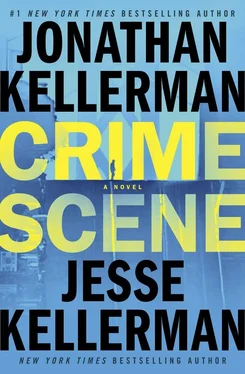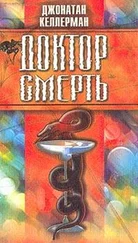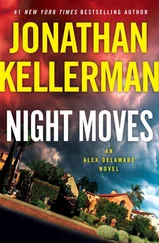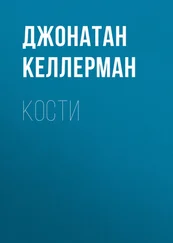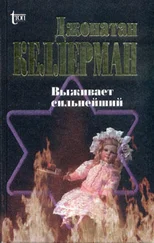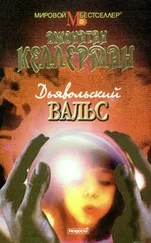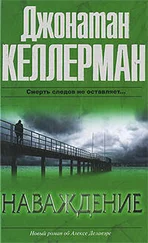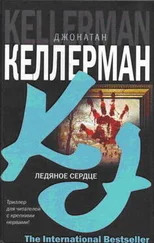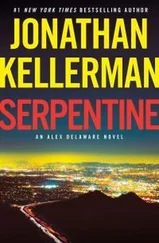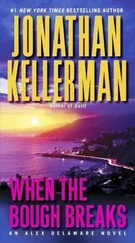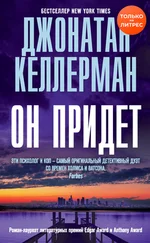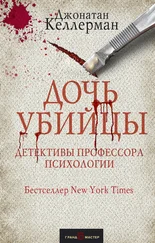The bottle contained the complete thirty days’ worth of pills. Two refills remained. Large black letters warned the user not to consume alcohol while taking this medication.
I opened up my phone to google risperdal alcohol interaction. No bars.
I put the bottles back in the glasses and went downstairs to find Zaragoza.
He was coming to find me.
“Fridge is basically bare,” he said. He’d been down to the basement, as well, finding a cityscape of moldy cardboard boxes and multi-tier wine racks, the bottles squeaky clean, indicating a healthy (or unhealthy) rate of turnover.
I described the attic and the desk, showing him the pictures on my phone. He headed upstairs to take some better shots with the Nikon and to bag the pill bottles.
I met Schickman at the door.
“We’re going to bring him in,” I said. “I’ll talk to the decedent’s daughter and give her a heads-up.”
“Yeah, man. Take your time. You need anything from us?”
Weird as it is to imagine a person researching his heart-attack-in-progress, I find it just as weird that others will literally yell, “I’m having a heart attack.” But they do, sometimes loud enough for neighbors to hear. Not to mention that a two-hundred-pound man yelping as he spills down a flight of stairs can produce a pretty significant racket.
The distance between Rennert’s house and the adjacent properties might dampen any noise. But no charge for asking.
I said as much to Schickman. “Be good to know if anyone heard anything, so if you’re offering, a canvass would be cool.”
Schickman rubbed his sunburnt neck. “Teach me to offer.”
Tatiana hadn’t budged from her corner of the parking area, and neither had Patrol Officer Hocking, though their relationship appeared to have outlived its usefulness. The officer had her hands jammed awkwardly in her pockets, and Tatiana was ignoring her, jabbing at her phone with stiff quick thumbs. She noticed me coming and shoved it in her purse, straightening up and shaking away a streamer of hair.
I said, “We’re almost done inside, and I wanted to let you know that we’ll be bringing your father out soon.”
“That’s it?” she said.
“Beg pardon?”
“You were in there for like half an hour.”
It had actually been an hour-plus. More than enough time to spend at a scene whose signs point toward a natural death. A smaller house? A guy who kept his medicine in the medicine cabinet? I really would’ve been done in thirty minutes.
I’ve learned to think before I speak, and that’s what I did, looking at the lovely, angry face in front of me.
I said, “What we do here is just a first step. In your father’s case, an autopsy will give us much more specific information. The police have to wait for us to finish before they go inside and start their work. We want to expedite that.”
She exhaled, a little sheepishly. “All right. Thank you.”
“Of course,” I said. “Have you had a chance to call someone?”
“My mom. I don’t know when she’ll get here. She’s coming from the city.”
“Right.” I turned to Hocking. “I think they could use a hand with the canvass.”
Hocking gave a tight, grateful nod and left us.
Tatiana watched her go. “She doesn’t believe me.”
She tilted her head at me. “You don’t either, do you.”
“I’m not sure what you mean,” I said.
“That he was pushed.”
I took out my notebook. “Let’s talk about that.”
It was their ritual, brunch, every Saturday for the last couple of years. She couldn’t remember how it had gotten started. Go to the French bakery on Domingo, get herself a cup of coffee, pastries for them to share. Did I know the bakery? They made the most authentic croissants; they’d won multiple East Bay best-of awards. She thought they imported their butter. She only went there once a week, otherwise she’d gain fifty pounds.
Normally, she stayed with her father for two to three hours, leaving in the early afternoon. She taught the one thirty p.m. class at a yoga studio on Shattuck. Sometimes she returned later in the day, bringing dinner for him, depending.
She didn’t say what that depended on. As she continued to talk, I filled in reasons.
He drank too much. He didn’t feed himself.
He was lonely.
They both were.
She loved him.
I asked when she had last seen her father alive.
“In person, not since Tuesday. Yesterday I called to ask if he wanted me to pick up anything in particular for today.”
“What time was that?”
“Ten, ten thirty a.m.”
“How did he sound?”
“Fine,” she said. “Normal.”
“Did he complain of any pain or discomfort, anything like that?”
A burr of suspicion appeared in her voice: “No.”
“I have to ask,” I said. “It’s important to be able to rule things out. How long has he taken medication for hypertension?”
“I don’t know. Fifteen years? But I told the police, it wasn’t a serious problem. He had it under control.”
“Aside from that, how was his health?”
“He’s seventy-five,” she said. “Normal things. Backaches. I mean, he was fine. Better than that. He played tennis several times a week.”
“Any other medications or conditions that you’re aware of?”
“No.”
“For his mood, or anything like that?”
“No.”
“Any mental health issues?”
Her face tightened. “Like what.”
“Depression, or—”
“If you’re asking me, did he hurt himself, that’s ridiculous.”
“I don’t mean to suggest that,” I said. “It’s just a routine—”
“I know. Okay. No, no issues. And no, he didn’t take anything else.”
I believed that she believed it.
I could have challenged her; shown her the bottle of Risperdal; asked her about Louis Vannen. But to what end? I play two roles, and I’m constantly balancing my need for information against my duty to console.
I said, “Officer Schickman told me you tried to do CPR.”
“I started to.” A beat. “Then I saw his face, and...”
She fell silent.
“It’s important for me to know how much he was moved,” I said.
She nodded listlessly. “Not much. I...” Her lips began to tremble and she flattened them against her teeth. “He’s heavy. For me.”
She was reliving it: wrestling with her father’s body, the sheer physical frustration, a horrifying and unasked-for intimacy.
I said, “Let’s talk about what you said, about him being pushed. What makes you think that?”
“Because it’s happened before,” she said.
I looked up from writing. “What has.”
“This.”
“Okay,” I said.
“See? You don’t believe me.”
“Can we back up, please? Something happened to your father—”
“Not him,” she said. “His student.”
“Student...?”
“Grad student. Here. At Cal.”
“Name?” I asked.
“Nicholas Linstad. He and my dad ran a study together. One of their subjects ended up going out and murdering a girl. At the trial my father testified against him. They both did.”
“When was this?”
“Early nineties. I was six, I think. Ninety-one or ninety-two.”
“All right. Your father and his student testify against an individual. What’s his name?”
“They never released it. He was a minor. Disturbed. The whole thing was awful.”
“I’m sure.”
“You don’t understand,” she said. “My father — it ruined him. Then they go and let this homicidal maniac out of prison. He’s walking the streets, my father helped convict him. You’d think somebody would warn us. It’s completely irresponsible. A month later, Nicholas falls down a flight of stairs and dies.”
Читать дальше
